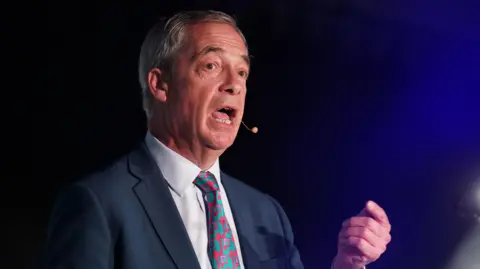In a striking development in Welsh politics, Nigel Farage, the leader of Reform UK, has expressed the party’s willingness to cooperate with any other political entity to form a government in Wales for the upcoming elections in May 2026. This commitment comes as the party aims to secure its first seats in the Senedd, the Welsh Parliament. Recent polling data indicates that Reform UK’s support trails closely behind that of Labour and runs neck and neck with Plaid Cymru, which heightens the anticipation surrounding the forthcoming elections.
During an interview with BBC Wales, Farage indicated an openness to potential agreements with other parties due to the anticipated complexities posed by the Senedd’s new voting system. He emphasized that the new electoral landscape will complicate efforts to achieve an outright majority, suggesting strategic alliances might be necessary. Although he dodged questions regarding the appointment of a new Welsh leader for the party before the elections, he assured followers that appropriate leadership will materialize in due course.
In related news, Kemi Badenoch, the leader of the UK Conservative Party, has remained reticent about entering any post-electoral agreements with Reform UK, even amidst heightened speculation about shifting alliances in Welsh politics. Historically, the Reform party struggled to secure any seats in the last Senedd elections held in 2021. However, the party demonstrated a significant performance in the preceding general election, securing second place in 13 constituencies across Wales.
Recent polls conducted by Survation in March and April of this year have provided a clearer picture of the political landscape, revealing Labour at 27%, with both Plaid Cymru and Reform UK at 24% each, while the Conservatives lagged behind at 15%. The new voting system set to be employed in 2026 will expand the Senedd from 60 to 96 seats, utilizing a list system designed to better reflect the electorate’s choices, which could reshape the balance of power significantly.
Farage has not dismissed the idea of forming a post-electoral pact with the Conservatives in a hung parliament scenario. He noted, “Confidence and supply relationships we will of course consider with anybody if it’s the right thing to do,” highlighting an eagerness to collaborate if beneficial for their political strategy. At this point, Reform UK lacks a defined leadership structure in Wales, especially since Oliver Lewis, who previously represented the party in the general election campaign, will not be standing for the upcoming Senedd elections.
Additionally, Farage acknowledged that the party currently does not have a clear candidate in mind for Welsh leadership, despite his confidence that capable “new talent” will emerge as they prepare for the electoral contest. He stated, “We haven’t even picked our candidates yet for the Senedd elections; once we do, it will become increasingly clear who will be the likely leader.”
Farage also discussed the party’s mission in Wales, indicating that he perceives a great deal of groundwork to be laid within a limited timeframe. He asserted that the party’s structure in Wales was developing positively, highlighting that the party is not merely a protest movement without specific policies for Wales. His assertive remarks included intentions to reindustrialize South Wales, critiquing current approaches to net zero policies which he deems damaging to the economy.
Concurrently, Kemi Badenoch has made it clear that the Conservative Party is “fighting to win” the upcoming Senedd elections while working to restore public trust following their previous electoral defeats, including the loss of all fourteen Welsh seats in Westminster during the 2024 General Election. Badenoch expressed her optimism that the Tories would be heading in a positive direction leading up to the elections, emphasizing the importance of focusing on the party’s offerings rather than potential alliances.
With the Senedd elections approaching, the political dynamics within Wales are shifting rapidly. Both Reform UK and the Conservatives are preparing strategies that reflect evolving public sentiments, as they navigate the complexities of Welsh politics and the implications of the new voting framework. As the parties gear up for an increasingly competitive landscape, the unfolding developments will undoubtedly shape the future trajectory of Welsh governance.



